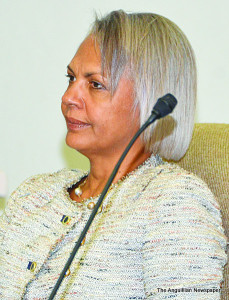
The Witness Protection Bill 2016, originally published as the Justice Protection Bill, was passed in the Anguilla House of Assembly on Tuesday this week with the full support of members.
Attorney General, Mr. Rupert Jones, said in part: “In Anguilla we have a vital need to protect witnesses to criminal activity. This would bring enormous benefits to the community – and detecting, investigating and prosecuting serious criminal offences will be enhanced greatly. We need, and I am sure all in Anguilla agree, that we need witnesses to come forward so that we can detect, investigate and prosecute crime. Some of those witnesses will be the very victims of criminal offences, and others will be bystanders or the like. If we, in Government, via the Royal Anguilla Police Force, and the Attorney General’s Chambers, cannot protect such witnesses, then they may not come forward and we may not be able to prosecute serious crime. I know that there are parts of the community which will be delighted to hear that we will seek to do everything to protect witnesses if they come forward.”

The Attorney General continued: “We know that in coming forward, firstly to give information to the Police, then to go on and give a witness statement, then after that give evidence in court, is an enormous undertaking for any person in a small community. In such a community they may face threats, violence or retribution. We understand what a commitment, that is, if a person is prepared to do that, despite all of those fears – because they believe profoundly in bringing criminals to justice and the benefits that would bring to the community. If they are prepared to make that commitment, and we wish sincerely that they do, we will back them all the way and we will do our very utmost to protect them, thus giving them that reassurance that they can, and should, come forward; and that if they do, we will protect them as witnesses.”
He went further: “We will protect them so that they have that reassurance. We will protect them after they become witnesses and we will protect them following giving evidence and following being witnesses. We will see through our duty to them. So, Mr. Speaker, I hope you can understand the real importance that witness protection has to the community and the rule of law in Anguilla.”
Mr. Jones observed that the law enforcement agency in Anguilla “has witness protection already but we need to put it on a statutory footing to make it transparent and accountable.”
During his discourse, the Attorney General indicated that there were several ways in which to protect witnesses and their families, including giving them police protection. He said another way would possibly be relocation outside Anguilla which can be costly. He disclosed that already there were two cases where witnesses in Anguilla were relocated at a cost of some EC $8,000 and US$10,000 respectively according to information from the Police. He explained that Anguilla, too, might be required to allow witnesses from other islands to be relocated here, but noted that the small population size of the island and knowledge of persons might be matters to consider.
Citing one of the provisions of the Act, relating to the above, Mr. Jones said: “There is a reciprocal arrangement under this Act to allow for Anguilla to accept participants [in a witness protection programme] from other jurisdictions, as a participating country, although the Commissioner of Police has been quick to point out that it would be unlikely that Anguilla would be a primary location that other jurisdictions would want to send their witnesses to. This is because it is a very small jurisdiction and it may well be that a newcomer is immediately identified, and confidentiality is an issue.”
Meanwhile, two other pieces of legislation were passed in the House of Assembly on Tuesday. They were the Anguilla Police (Amendment) Act 2016 and the Scheme of Arrangement (BAICO and CLICO) Act 2016. While in its draft form, the Police Act was the subject of much public discussion and amendments.
The Police Act “gives the police the power to take measurements, photographs, fingerprint impressions and non-intimate samples from arrested persons. Further, those measurements, photographs, fingerprint impressions and non-intimate samples are admissible as evidence before the courts.”
The Scheme of Arrangement (BAICO and CLICO) Act 2016 relates to the insolvency of the two insurance companies in which persons in Anguilla and other Caribbean islands held insurance policies and whose interests need to be protected.
The House of Assembly returned on Wednesday to give two other pieces of legislation their second and third readings. They were Immigration and Passport (Amendment) Bill 2016 and the Control of Employment (Amendment) Bill 2016.








